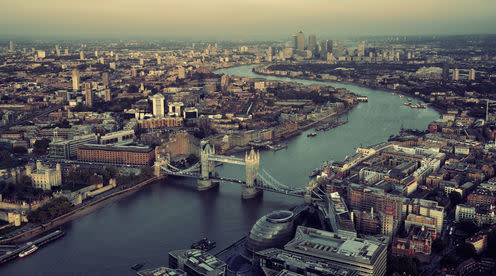London after Brexit: independence a non-starter but special status could protect global position

The exit of the United Kingdom from the European Union leaves London in a peculiar position. London is Europe’s – if not the world’s – preeminent global city and financial centre. And this is in no small part because it makes its living off its connections to both Europe and the wider world. Consequently, the reality of Brexit is likely to be particularly acute and consequential for London’s economy and workforce, over and above the rest of the UK.
Given that almost 60% of Londoners voted to remain in the EU, it’s perhaps not surprising that the familiar question of whether London should become an autonomous city-state has resurfaced.
The idea was first proposed back in the 1990s, and resurfaced most recently during the Scottish independence referendum of 2014. Now, Brexit has highlighted stark contrasts in voting preference across the UK. Remain achieved a majority in London, Scotland, Northern Ireland and Gibraltar, while Leave won more votes in England and Wales.
These divides have resurrected the issue of Scottish independence, with Scotland’s First Minister Nicola Sturgeon putting the prospect of another referendum back on the table. And now, it appears this move has inspired more than 120,000 Londoners to petition the city’s mayor, Sadiq Khan, to take London out of the UK and re-enter the EU.
International city
On one level, the idea makes sense: ever since the 1970s, London has become ever more detached from the rest of Britain; in the UK, but increasingly not of the UK. It is not simply that the UK has become more London-centric. Rather, London has become a metropolis that belongs to the world. The city has gradually separated from its national territory, and increasingly operated as another country whose role, status and success is determined by its relation with the world, rather than with the rest of the UK.
Throughout several decades of globalisation, the UK has been pooling its sovereignty, or losing control, over many issues that were traditionally its sole reserve. International agreements and policies for more open access, the liberalisation of international trade in goods and services, reduced state control through privatisation, decreasing regulation and bureaucracy and more open migration has meant that the UK has reconfigured or lost many of its previously exclusive powers.
With the formation of the European Union, international institutions –- such as the World Bank and the International Monetary Fund –- and international regulatory bodies, London is no longer just the capital of the UK; it stands alongside New York as the world’s most important global city and international financial centre: one of the twin capitals of the global economy.
Londependence day
There are three main points typically used to argue that London should go it alone. For one thing, London’s economic dominance over the rest of the UK is highlighted, to argue that London effectively subsidises the rest of the UK with little benefit to itself. Taxes levied on London exceed what is returned in government spending, providing a net subsidy to the rest of the UK worth about a fifth of its GDP.
What’s more, London’s economic, political, cultural and demographic differences to the rest of the UK were further widened by the city’s greater resilience in weathering the 2008 global financial crisis. By emphasising London’s unique global role, campaigners seek to present it as alien to the UK; another country, which is more cosmopolitan and global; an economic success story with well-paid jobs, sky-high property values and rapid growth.
Finally, it is argued that London is a problem for the UK as a whole. The argument goes that the rest of the UK is hamstrung by the success of a London, which takes away its resources, talent, people and investment. It is suggested that letting London go could allow what remains of the UK to build an economy that is more geographically and economically balanced; not hyper-focused on the south-east and financial and commercial services.
The idea that London will become an independent city-state, a kind of “Singapore in Europe”, is improbable, to say the least. Unlike many other European cities, London has no history of political independence – even having an elected mayor is a relatively recent phenomenon. As it stands, there is no established precedent, and therefore no mechanism, no jurisdiction, no authority and no will to take such a bold step.
But perhaps the notion of a London that is somehow still within the EU single market is not a complete political impossibility. The brutal fact is that the interests of London do not necessarily coincide with those of the rest of the UK – and our politicians need to recognise that.
So, the aftershocks of Brexit could lead to London being granted some kind of special autonomy within the UK. There’s no doubt that London would welcome the devolved powers, policies and taxations that it needs to protect and enhance its position as a premier global city and the leading financial centre on the European and global stage. One thing is for sure, London’s voice – through City Hall – needs to be heard in the negotiations that will now take place, over the nature of the UK’s divorce from Europe.
This article was originally published on The Conversation. Read the original article.

Richard G Smith does not work for, consult, own shares in or receive funding from any company or organisation that would benefit from this article, and has disclosed no relevant affiliations beyond the academic appointment above.

 Yahoo News
Yahoo News 